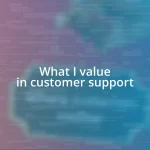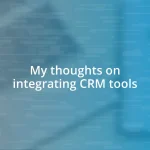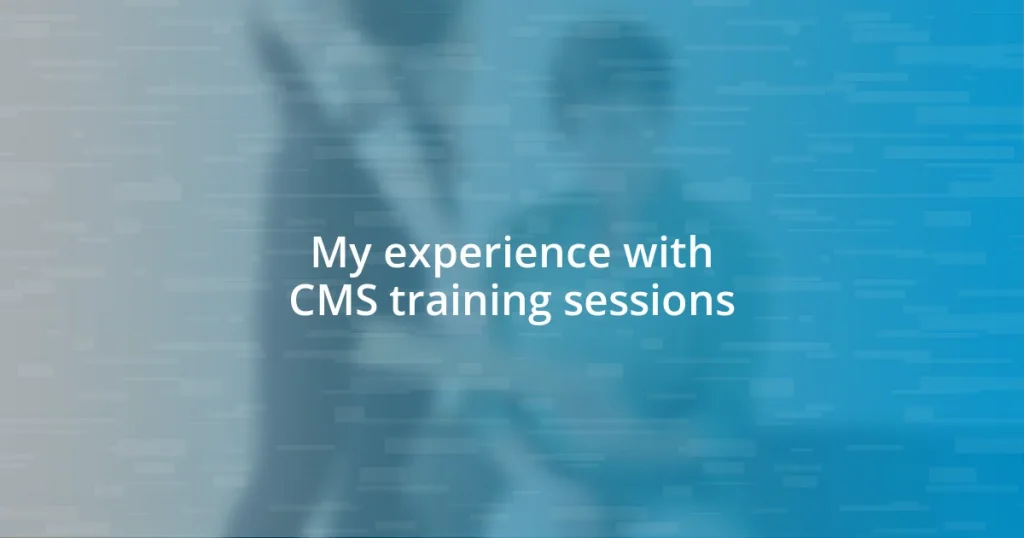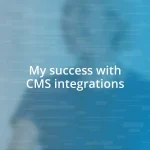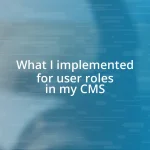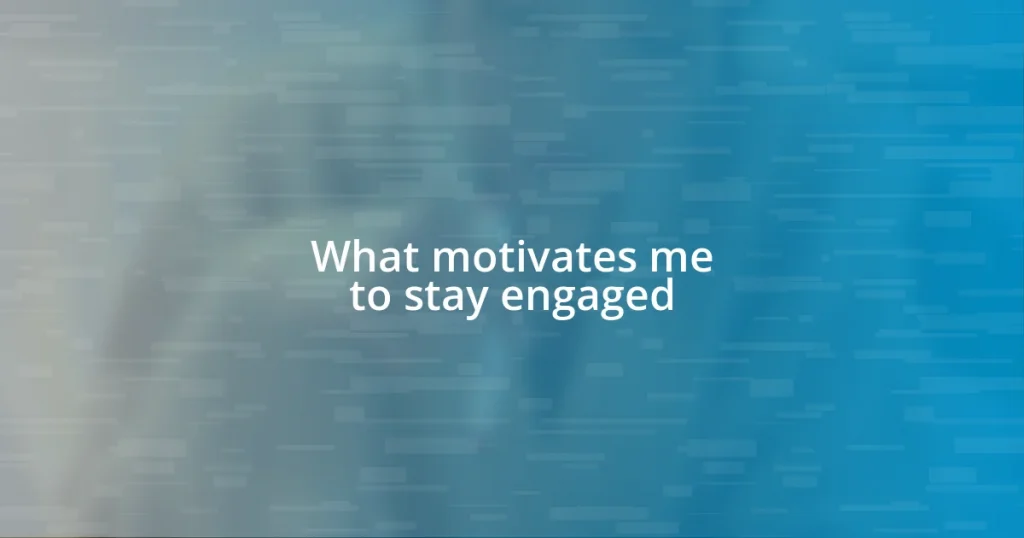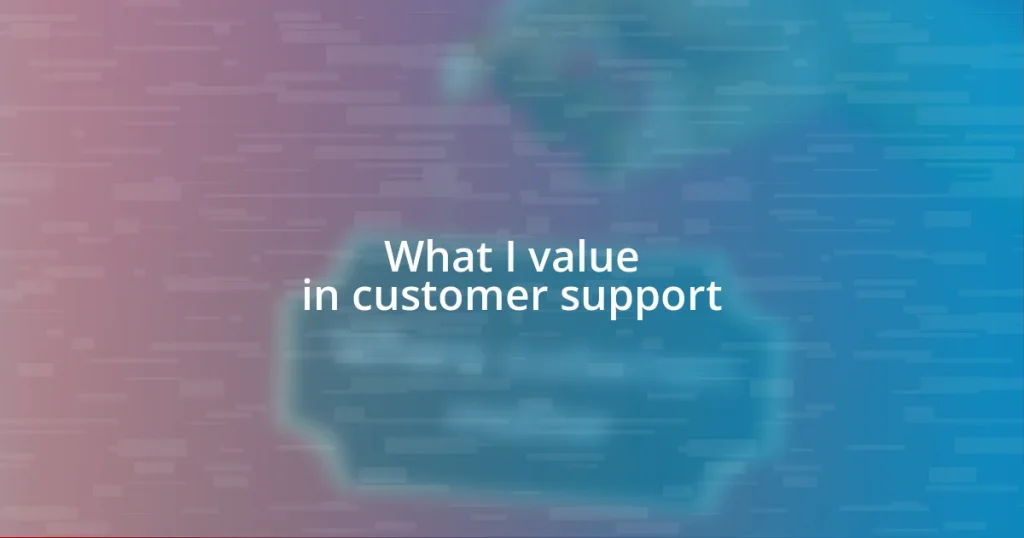Key takeaways:
- Understanding CMS basics is essential for effective website management and troubleshooting, leading to increased confidence and opportunities.
- Active participation in CMS training sessions fosters collaboration, hands-on practice, and valuable resource acquisition that enhances learning retention.
- Continuous learning and community engagement through resources, mentorship, and shared experiences are crucial for mastering CMS and keeping up with evolving trends.
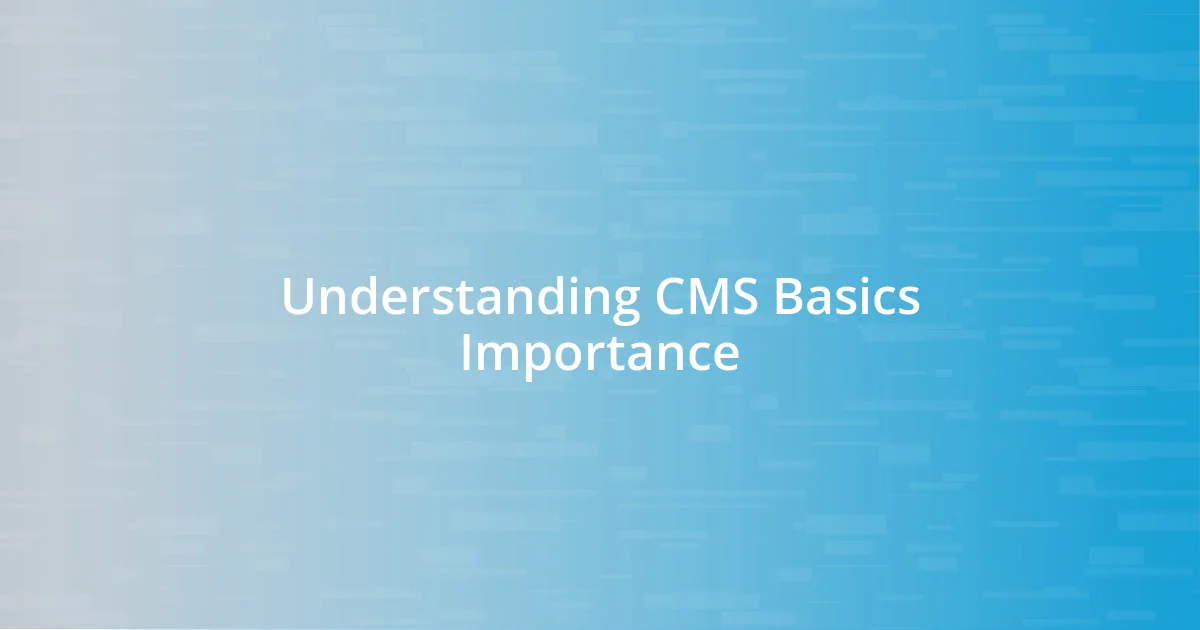
Understanding CMS Basics Importance
Understanding the basics of a Content Management System (CMS) is crucial for anyone involved in website management. In my early days of using a CMS, I remember feeling overwhelmed by its functionalities. But once I grasped the fundamental concepts, it transformed my workflow entirely. Isn’t it incredible how a solid foundation can empower us to explore more advanced features confidently?
Connecting with a CMS on a basic level allows us to customize our digital presence effectively. I recall a moment when I created a simple blog post that, with the right understanding, turned into a full-fledged article with rich media, interactive elements, and improved SEO. I often wonder: how many opportunities might we miss if we neglect these basics?
Moreover, understanding the basics can help mitigate frustrations associated with troubleshooting and managing content. I’ve had my share of “tech panic” moments when something didn’t work right, but when I went back to the basics, I often found the solution. It’s a reminder that sometimes, stepping back to the basics can lead us to breakthroughs.
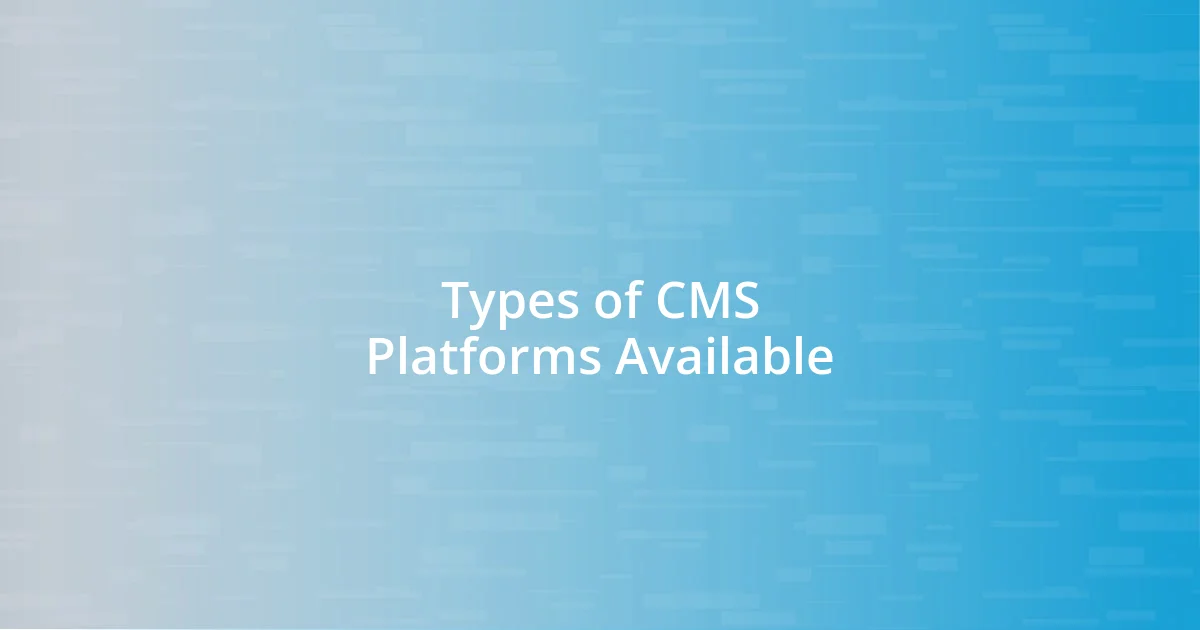
Types of CMS Platforms Available
When it comes to CMS platforms, a variety of options are available, catering to different needs and preferences. I remember the first time I explored different types; it felt like walking into a candy store. Each platform offered unique features that could shape the way I created and managed content. For instance, I found WordPress particularly user-friendly, great for bloggers and small businesses. On the other hand, platforms like Drupal seemed robust but required a bit more technical know-how, which both intimidated and intrigued me.
Here’s a list of some common CMS platforms:
- WordPress: Known for its ease of use and versatility, ideal for blogs and small business sites.
- Drupal: More complex, best for developers needing advanced functionality and flexibility.
- Joomla: Offers a balance between user-friendliness and powerful features, suitable for social networks or e-commerce.
- Magento: Tailored specifically for e-commerce, built to handle large product catalogs.
- Shopify: Simplified platform for creating online stores with integrated payment options.
Each platform has its own vibe, and discovering which one suits your style can turn the daunting task of managing a website into an exciting journey. I remember feeling a rush of satisfaction when I finally settled on a platform that matched my vision; it was like finding the right key to unlock my creative potential.
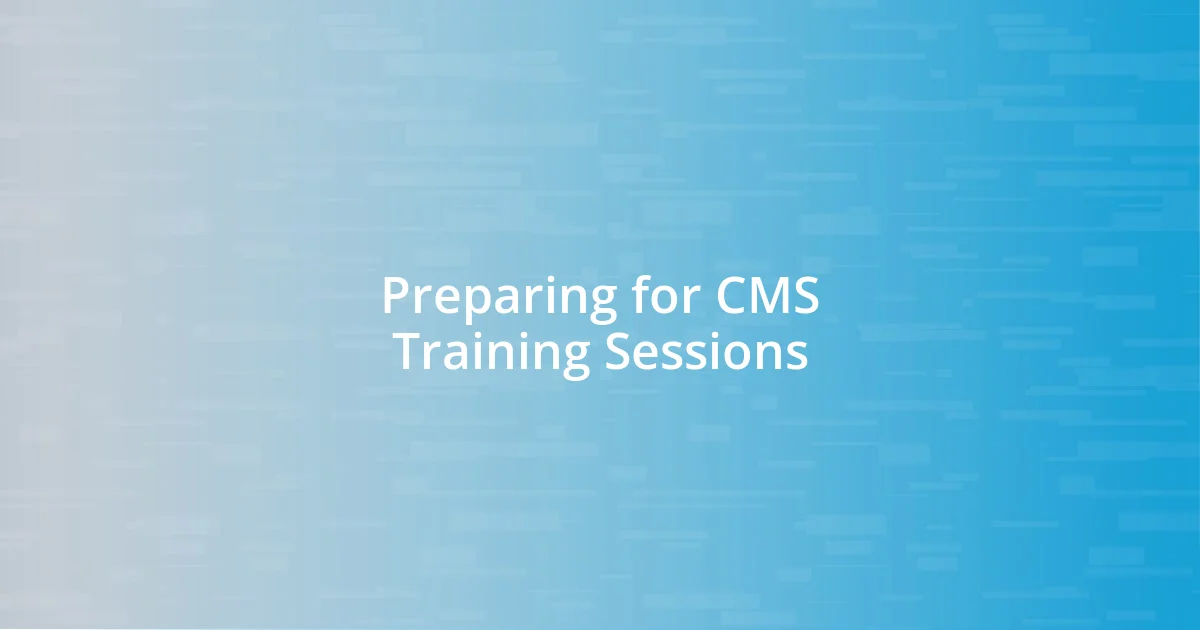
Preparing for CMS Training Sessions
Preparing for CMS training sessions requires a mix of organization and mindset. I’ve learned that setting clear goals before any training can help guide your learning experience. For instance, during my first training session, I focused primarily on understanding the layout of the CMS. I often reflect on how having that sense of direction transformed what could have been a confusing jumble of information into an engaging learning journey.
Creating a learning environment is equally important. I remember prepping my workspace with notes, snacks, and even a cozy blanket for those long sessions. This made all the difference in my engagement levels. It’s a simple gesture, but ensuring comfort can free your mind to absorb more information. Have you ever experienced how the right environment can change your entire outlook? It’s remarkable.
Lastly, consider practicing with sample projects before the training begins. I recall tinkering with a demo website a week before my first formal session. It helped me familiarize myself with the CMS, giving me the confidence to ask informed questions. Engaging with the platform beforehand often leads to deeper insights during important discussions.
| Preparation Strategy | Description |
|---|---|
| Set Clear Goals | Identify specific areas of focus for your training to streamline learning. |
| Create a Learning Environment | Prepare your space with comfort items to enhance concentration. |
| Practice with Sample Projects | Familiarize yourself with the CMS through hands-on experience before training. |
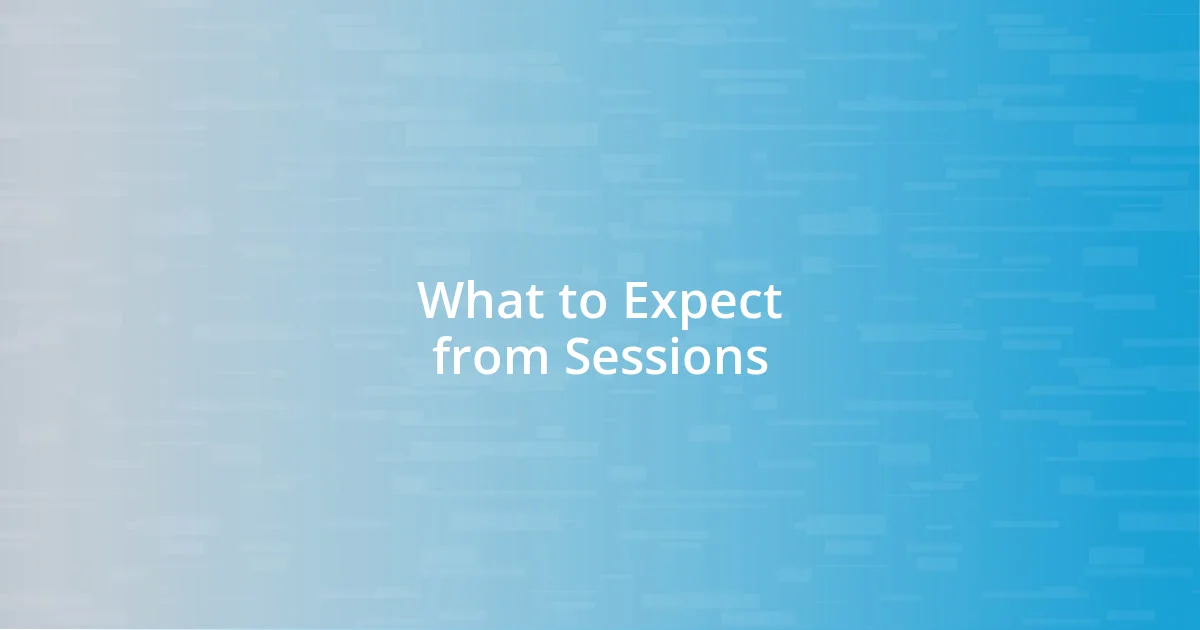
What to Expect from Sessions
When you step into a CMS training session, expect a blend of both practical knowledge and interactive learning. I remember my first session vividly—it started with an overview, followed by a hands-on demonstration. Watching the instructor showcase the features in real-time was eye-opening; it felt like unlocking a treasure chest full of tools I could wield to create remarkable content.
As the session progressed, we were encouraged to engage, ask questions, and share our thoughts. I still recall how exhilarating it was to collaborate with fellow learners. Their insights often sparked new ideas in me; it’s incredible how diverse perspectives can enhance understanding. Have you ever noticed how sharing experiences in a group can really illuminate concepts that seemed abstract when considered alone?
Moreover, you can expect to receive valuable resources to use beyond the sessions. I found that the training materials provided were not just post-session paperwork but foundational tools I referred back to regularly. Having that support made my learning curve much smoother and genuinely enriched my journey into mastering the CMS. Wouldn’t it be fantastic to have a reliable reference guide at your fingertips as you experiment and explore your creativity?
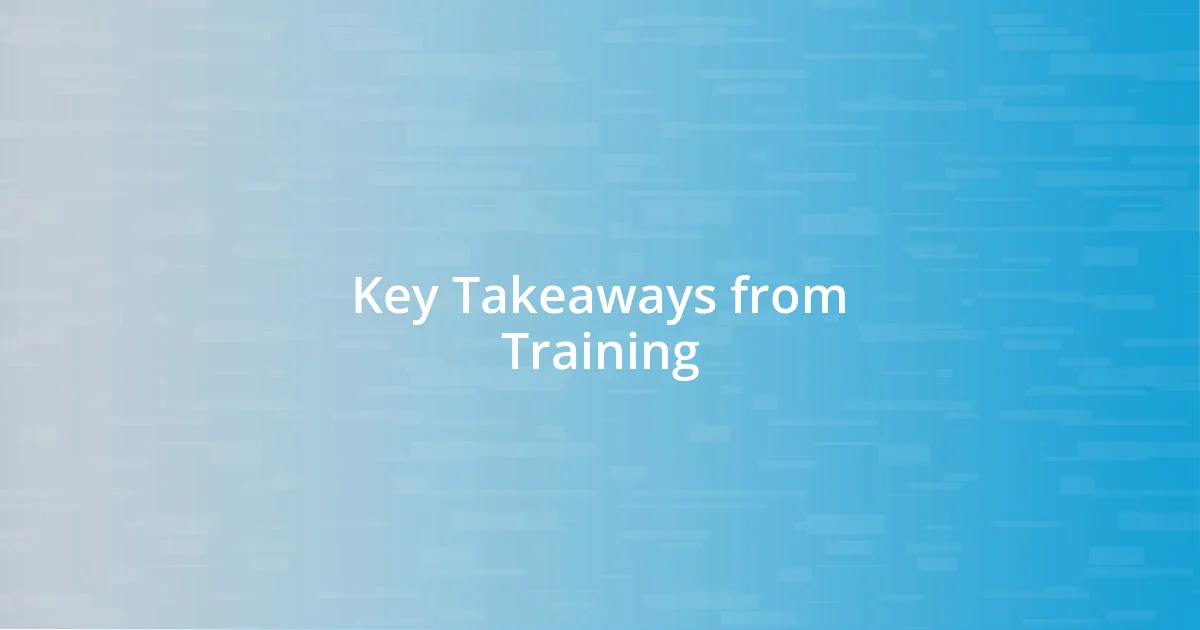
Key Takeaways from Training
Throughout my CMS training sessions, one key takeaway was the importance of community and collaboration. I distinctly remember a moment when a fellow participant shared their unique approach to troubleshooting issues. It was like a light bulb went off for me! Have you ever had an insight from someone else’s experience that completely changed your perspective? That exchange not only deepened my understanding but also made me feel part of a supportive network. It’s a reminder that sometimes, learning is as much about the people around us as it is about the content itself.
Another significant insight was recognizing the value of hands-on practice during the training. Initially, I was a bit hesitant to dive in, but I quickly realized how critical it was to try out the CMS features as we learned them. There was a moment when I hesitated while editing a page. The instructor encouraged me to take the leap and just experiment. I did, and it felt exhilarating to see my changes in real-time. Can you recall a moment when you took a risk in learning, and it paid off? Those small victories during training not only boosted my confidence but also cemented my understanding of the CMS functionalities in a way that theoretical knowledge never could.
Finally, I discovered that following up on training topics independently greatly enhanced my retention. After each session, I made it a point to revisit the tasks we’d covered. I remember spending one weekend revisiting the video tutorials and taking thorough notes. It was like piecing together a puzzle—I could finally see how all the different parts fit. Do you ever feel that revisiting information can lead to those “aha” moments? It truly reinforced my learning and helped cement the concepts in my mind, making it much easier to apply them later.
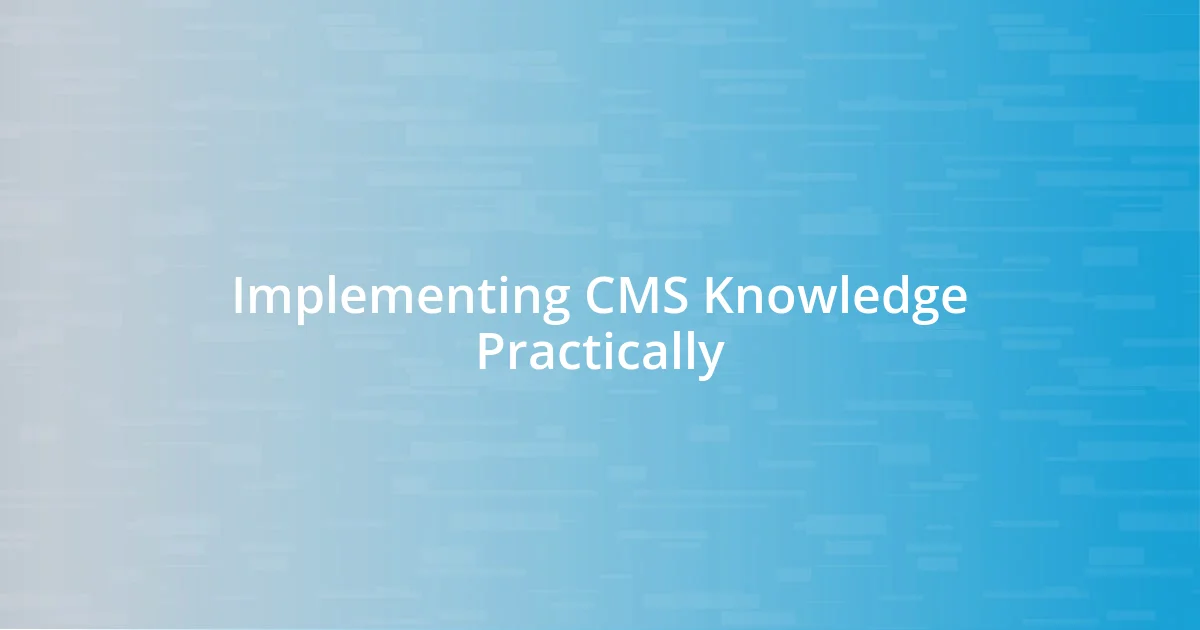
Implementing CMS Knowledge Practically
Implementing the knowledge I gained from the CMS training sessions was a rewarding experience. After learning new features, I eagerly dove into my website to apply them. I remember the rush I felt when I first used a newly learned function to create a dynamic page—it was like witnessing my vision come to life. Have you ever experienced that surge of excitement when theory meets practice? That moment when you realize you can bring your ideas to fruition is simply unbeatable.
Another practical application involved collaborating with my team to refine our content strategy. We scheduled regular brainstorming sessions where we experimented with the CMS tools. One day, we developed an interactive element that I had only seen during training. Seeing my colleagues engage with it and receive positive feedback was truly uplifting. It reinforced for me how vital it is to apply what we learn in stimulating environments. How satisfying is it to create something together that enhances the overall user experience?
Reflecting on my progress, I realized that documenting my experiences played a crucial role in solidifying my knowledge. After each project, I would jot down what worked well and what didn’t. I recall reviewing these notes before new tasks, and it felt like having a personal coach guiding me. Isn’t it interesting how writing about our experiences can clarify our thoughts? This practice not only made me more confident but also helped me identify areas for improvement that I might have overlooked otherwise.
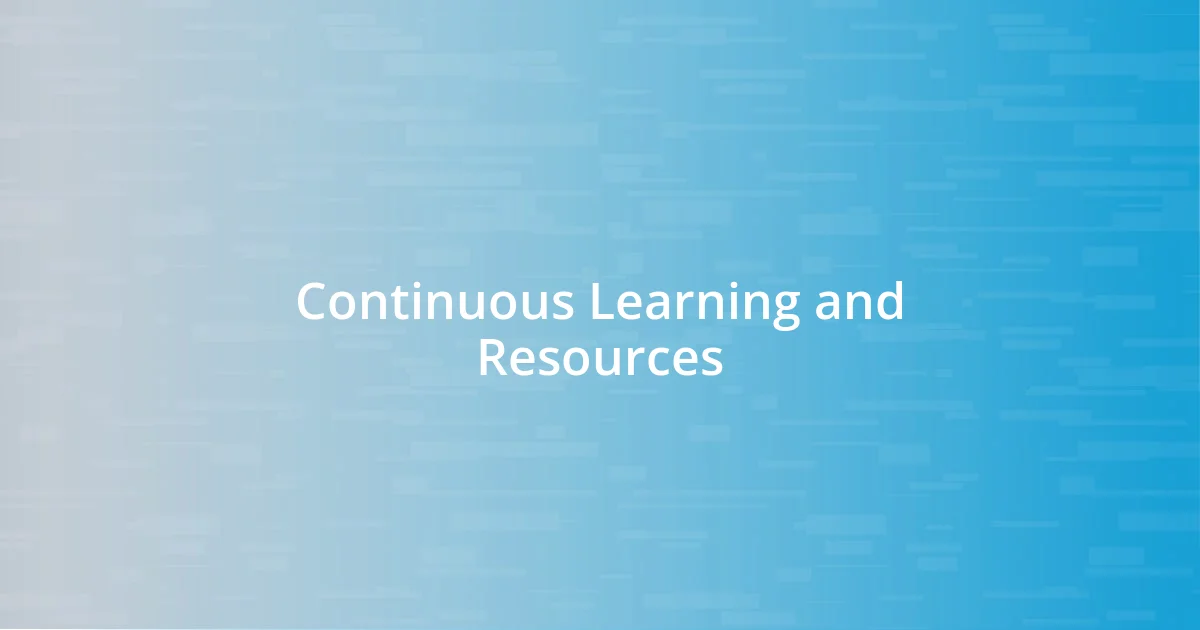
Continuous Learning and Resources
Continuous learning is a journey I’ve genuinely come to appreciate, especially in the realm of CMS training. After the sessions, I sought out additional resources to deepen my understanding. I remember exploring online forums and webinars related to CMS—found treasures filled with tips I hadn’t encountered during training. Have you ever stumbled upon a resource that completely transformed your skills? Engaging with diverse materials made me realize that learning doesn’t end when the training does; it’s an ongoing process that keeps me connected with the latest trends and techniques.
One aspect that surprised me about self-directed learning was how effective it was to join community groups or platforms where people shared their experiences. I often participated in discussions, which not only broadened my knowledge but also built a sense of camaraderie among us. There was a time when, in a group chat, someone posed a question that led to a lengthy exchange of ideas—together, we explored nuances of CMS features that I hadn’t even considered. It made me wonder, how often do we miss out on profound insights by not reaching out to others?
Reflecting on available resources, I found mentorship exceptionally valuable. I reached out to a colleague who had significant experience with CMS, and they enriched my understanding beyond the classroom. I vividly recall our conversations where they guided me through some complex functionalities, which felt like having a flashlight in a dark room. Have you ever sought guidance from someone with more experience, only to discover a new passion for the subject? Those mentorship moments not only boosted my confidence but also enabled me to approach challenges with a clearer mindset.


